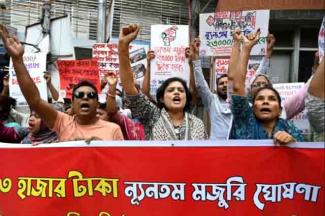Garment Workers in Bangladesh Protest Exploitative Conditions
Bangladesh's garment industry is the backbone of the country's economy, employing millions of people and generating billions of dollars in annual exports. It has been heralded as a model of economic growth for resource poor countries in the Global South. Participation of women in the industry has been heralded as a breakthrough for women’s rights. However, the industry has long been plagued by low wages, poor working conditions, and lack of safety regulations. We have seen the result of deadly negligence of safety by Bangladeshi capitalists in tragedies like Rana Plaza.
The most recent wave of protests of garment workers against such exploitative working conditions began in October 2023, when garment workers demanded a tripling of the minimum wage from 8,000 takas (₹6050) to 23,000 takas (₹17,390) per month. The protests quickly escalated, with tens of thousands of workers taking to the streets in major cities across the country. The government announced a new salary structure in November with a minimum wage of 12,500 taka (₹9,450), but workers have said that these are starvation wages.
As workers’ protests spread, the police responded with alarming brutality. The police are so far accused of killing three protestors. The unionists have also been arrested in order to prevent further protests. On the other hand, workers were threatened by armed goons to cease the protests immediately. Factory owners also threatened to shut down production and withhold wages by applying a “no work, no pay” rule. Over the weekend, more than 150 factories closed “indefinitely”, as police issued blanket charges for 18,000 workers in connection with the demonstrations. Bangladesh Garment Manufacturers and Exporters Association, a trade body also threatened to withhold recruitment if protests continue.
The global disparities are rarely as evident as in the garment industry. International clothing brands, including Levi's, Zara and H&M have continued to work with exploitative partners in Bangladesh despite international outcry. The typical retail price of a pair of Levi's signature 501 jeans is around $80, which is more than the current minimum wage of 8,000 taka ($72.5) per month for garment workers in Bangladesh. The deteriorating working conditions have also meant that some of the metrics by which Bangladesh had progressed is now facing downward pressure. The news agency Sputnik noted that the share of female workers in the garment industry in Bangladesh had fallen from 80% to 60% in recent years because of increased automation in the sector and growing social pressure on women to dedicate more time to work in the household and taking care of their children.
The Awami League government led by Sheikh Hasina that faces an upcoming election has sought to use brutal and repressive tactics against both political opposition and the working-class movement in the country. Workers around the world must stand in solidarity with the workers of Bangladesh.

